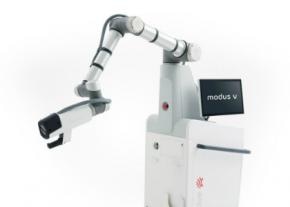Apr 9 2018
Modus V™, a completely automated, robotic digital microscope from Synaptive Medical Inc., has been utilized by neurosurgeons at North Shore University Hospital (NSUH) to perform brain surgery. NSUH neurosurgeons have incorporated Modus V in a medical first in the tri-state area.
The robotic arm of Modus V is derived from the Canadarm technology used on the International Space Station—the same robotic arm technology that NASA uses to install, grab, and repair satellites in space.
 Synaptive Medical’s Modus V digital microscope with surgical robotic arm. (Image credit: Northwell Health)
Synaptive Medical’s Modus V digital microscope with surgical robotic arm. (Image credit: Northwell Health)
Modus V enables neurosurgeons to perform delicate brain surgery with much more precision, potentially allowing for less-invasive procedures that lead to quicker recovery times and reduced complications. The technology allows for increased surgical efficiency through hands-free control, better ergonomics during brain surgery and greater versatility in the operating room. The digital microscope’s high-definition images offer a wider view of the surgical field and more enhanced images, improving the neurosurgeon’s ability to perform even the most complex brain surgery.
Michael Schulder, MD, Director of the Brain Tumor Center at Northwell Health’s Neuroscience Institute & Leader of the Synaptive Technology Project at NSUH
The innovative robotic imaging technology was used in a surgery performed on March 30, 2018, by cerebrovascular neurosurgeon Henry Woo, MD, to eliminate a meningioma from Joseph Ventimiglia, of East Setauket, NY.
The Synaptive Modus V incorporates multiple technologies including digital operative microscopy and robotics into a single seamless integrated platform. The technology allows surgeons to more efficiently utilize and incorporate preoperative imaging modalities during procedures that will hopefully shorten procedure times and improve outcomes. In this case, I was able to see around a bony edge to better visualize the tumor’s attachment to the dura and sagittal sinus at an angle that would have been impossible with a standard surgical microscope.
Henry Woo, MD
The advantages of Modus V include hands-free positioning with tracked instrumentation as well as automated robotics, which enable the surgeon to reach the desired visualization angles without interrupting the process. Another benefit is the device’s novel version of “auto focus,” which enables the image to remain focused on the tip of the surgeon’s instrumentation, constantly refocusing when the surgeon operates on different areas of the anatomy.
Synaptive’s BrightMatter™ software platform, when used in combination with the Modus V robotic digital microscope, displays automated, whole brain tractography, thereby mapping out the fiber tracts in the patient’s brain with the help of magnetic resonance imaging (MRI). This information is later integrated into the intraoperative navigation screen at the time of the surgery. In order to make sure that the least disruptive path is selected without damaging adjacent healthy tissues, the images are displayed beside the optical image of the digital microscope in real time.
The Synaptive Modus V represents the next step in the evolution of neurosurgical technology that allows improved access and increased versatility for a wide variety of neurosurgical procedures, including patients with brain tumors, cerebrovascular conditions and many disorders of the spine as well. The combination of maximal information of brain function, as well as improved intraoperative visualization, has the potential to make brain surgery as safe and as effective as possible.
Michael Schulder, MD, Director of the Brain Tumor Center at Northwell Health’s Neuroscience Institute & Leader of the Synaptive Technology Project at NSUH